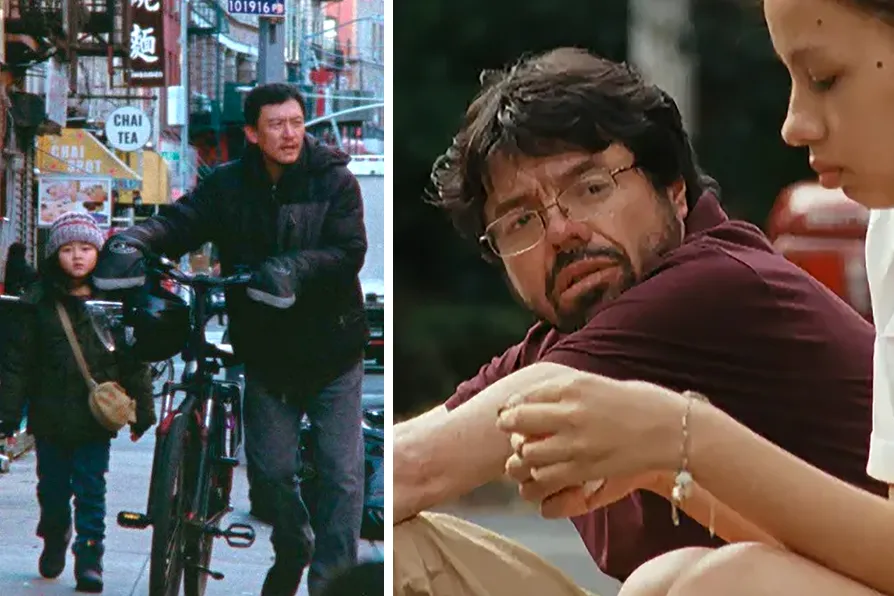GORDON PARSONS applauds a marvellous story of human ingenuity and youthful determination, well served by a large and talented company
RITA DI SANTO points out the social experience of exploitation and oppression that inform the popular winners at this year’s festival

 (L) Lloyd Lee Choi’s Lucky Lu; (R) Guillermo Cardona in Simon Mesa Soto’s A Poet [Pics: IMDb]
(L) Lloyd Lee Choi’s Lucky Lu; (R) Guillermo Cardona in Simon Mesa Soto’s A Poet [Pics: IMDb]
THE winner of El Gouna Film Festival’s Golden Star was Colombian director Simon Mesa Soto’s A Poet.
This enchanting film masterfully blends humour and emotion, exploring the difficulties of navigating a creative path while facing financial hardships. It centres on Oscar Restrepo, who dreams of dedicating his life to poetry. The narrative unfolds in a series of chapters, beginning with Failure, a title that encapsulates Oscar’s struggles.
Once a promising voice in the literary world with two published books early in his adult life, he now faces the harsh judgement of those around him. Relying on his elderly mother’s pension, he accepts a teaching job. During one of his classes, Oscar encounters a young girl poet whose rhymes express her own lower-class struggles. Captivated by her raw talent, Oscar sees in her the potential for greatness, yet she is pragmatic in her aspirations. Determined to pursue her career only if it offers a way out of poverty.
The film critiques the societal pressures that dictate what is deemed valuable. The tone skilfully shifts from the absurd to the serious, incorporating satire to mirror the chaotic journey of artists navigating societal expectations and economic constraints. These seemingly contrasting tones coexist harmoniously, creating a rich tapestry of emotion and insight.
The director, with exceptional skill, manoeuvres this unique blend, crafting a narrative that feels both relatable and thought-provoking.
Winner of the Silver Star award was Lloyd Lee Choi’s Lucky Lu. A heartbreaking narrative cantered around Lu, a food delivery driver in New York City. After five years in the United States, Lu clings to his dream of opening a restaurant while navigating the challenges of survival in a bustling metropolis.
Through Lu’s character, the film delves deep into the immigrant experience. The interactions he has with the city’s diverse inhabitants enrich his story, highlighting the contrasts between his quiet personal battles and the vibrant life of New York City.
The Bronze Star award went to Egyptian director Mohamed Rashad’s The Settlement. This poignant narrative dives deep into the struggles of the working class, centring on a young man who must take over his father’s role after his tragic death in a work accident.
Rashad’s storytelling style is straightforward, drawing comparisons to the works of Ken Loach and the neo-realist movement. The film embraces a raw cinematic simplicity, with a camera that captures the harsh realities of daily life where hope often feels out of reach. However, it’s the subtle moments of human connection that truly resonate, particularly the protagonist’s relationships with his mother and younger brother, which inject warmth into the narrative.
The Settlement takes a bold political stance on cinema’s role in reflecting reality. It honours its protagonist, portraying him as a hero striving to overcome adversity rather than a mere victim of circumstance.
Also worth mentioning is the winner of the Audience Award, Happy Birthday, directed by Egyptian filmmaker Sarah Goher. This poignant entry is Egypt’s Oscars submission.
It unfolds the compelling narrative of Toha, a young maid from a working-class background, whose aspirations and struggles are set against the stark class divisions of contemporary Cairo. At just eight years old, Toha is determined to orchestrate a perfect birthday celebration for Nelly, the daughter of her affluent employer. Despite their shared age and fleeting moments of joyful play, the film starkly contrasts their lives.
Happy Birthday dives deep into the complexities of class dynamics in Egypt. The narrative captures the harsh realities faced by those from lower socio-economic backgrounds, depicting Toha’s struggle with the loss of her father, a fisherman, and the weight of supporting her family through labour that, while illegal, continues to persist in secrecy.
A powerful commentary on social inequality, Goher’s film resonates profoundly with the festival’s theme of humanity, challenging viewers to confront uncomfortable truths about child labour and societal hypocrisy. While child labour is prohibited by law in Egypt, the film starkly reveals the hypocrisy of a society where rule-breakers go unpunished. It ignites a crucial debate, underscoring a reality that extends beyond Egypt’s borders; it is a call to action, urging viewers to reflect on the systemic inequalities that persist in our global society.









